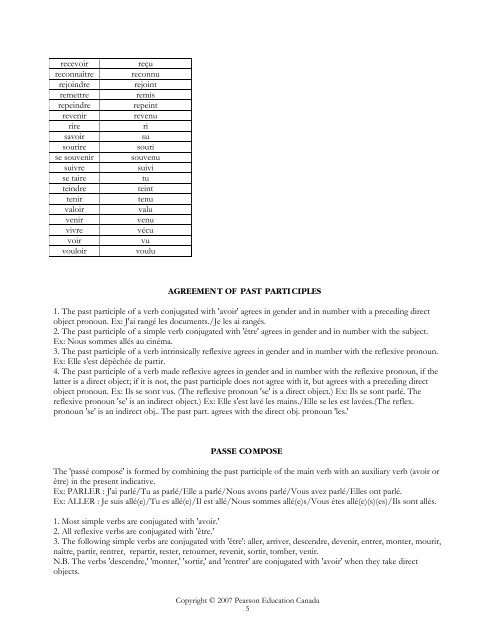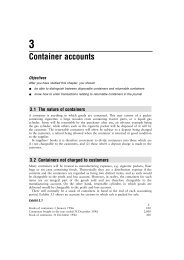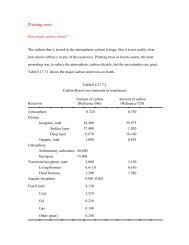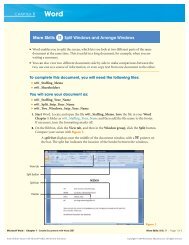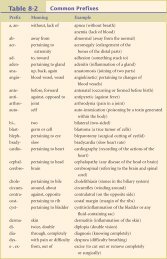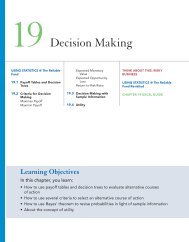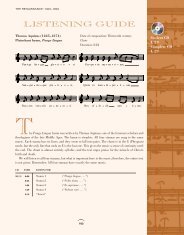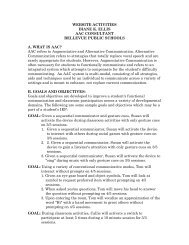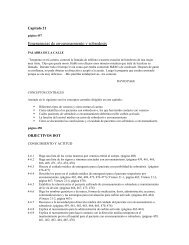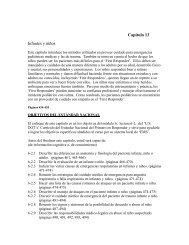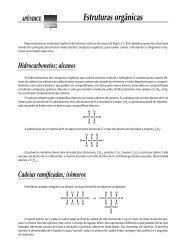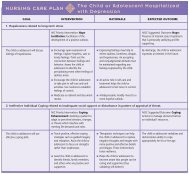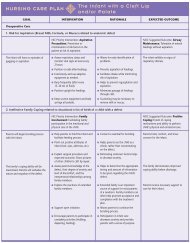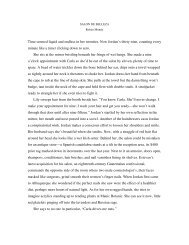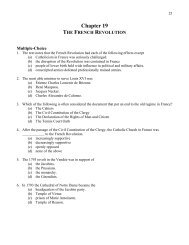French Verb Primer by Helene Gallier-Morgan Regular ... - Pearson
French Verb Primer by Helene Gallier-Morgan Regular ... - Pearson
French Verb Primer by Helene Gallier-Morgan Regular ... - Pearson
Create successful ePaper yourself
Turn your PDF publications into a flip-book with our unique Google optimized e-Paper software.
ecevoir reçu<br />
reconnaître reconnu<br />
rejoindre rejoint<br />
remettre remis<br />
repeindre repeint<br />
revenir revenu<br />
rire ri<br />
savoir su<br />
sourire souri<br />
se souvenir souvenu<br />
suivre suivi<br />
se taire tu<br />
teindre teint<br />
tenir tenu<br />
valoir valu<br />
venir venu<br />
vivre vécu<br />
voir vu<br />
vouloir voulu<br />
AGREEMENT OF PAST PARTI CIPLES<br />
1. The past participle of a verb conjugated with 'avoir' agrees in gender and in number with a preceding direct<br />
object pronoun. Ex: J'ai rangé les documents./Je les ai rangés.<br />
2. The past participle of a simple verb conjugated with 'être' agrees in gender and in number with the subject.<br />
Ex: Nous sommes allés au cinéma.<br />
3. The past participle of a verb intrinsically reflexive agrees in gender and in number with the reflexive pronoun.<br />
Ex: Elle s'est dépêchée de partir.<br />
4. The past participle of a verb made reflexive agrees in gender and in number with the reflexive pronoun, if the<br />
latter is a direct object; if it is not, the past participle does not agree with it, but agrees with a preceding direct<br />
object pronoun. Ex: Ils se sont vus. (The reflexive pronoun 'se' is a direct object.) Ex: Ils se sont parlé. The<br />
reflexive pronoun 'se' is an indirect object.) Ex: Elle s'est lavé les mains./Elle se les est lavées.(The reflex.<br />
pronoun 'se' is an indirect obj.. The past part. agrees with the direct obj. pronoun 'les.'<br />
PASSE COMPOSE<br />
The 'passé composé' is formed <strong>by</strong> combining the past participle of the main verb with an auxiliary verb (avoir or<br />
être) in the present indicative.<br />
Ex: PARLER : J'ai parlé/Tu as parlé/Elle a parlé/Nous avons parlé/Vous avez parlé/Elles ont parlé.<br />
Ex: ALLER : Je suis allé(e)/Tu es allé(e)/Il est allé/Nous sommes allé(e)s/Vous êtes allé(e)(s)(es)/Ils sont allés.<br />
1. Most simple verbs are conjugated with 'avoir.'<br />
2. All reflexive verbs are conjugated with 'être.'<br />
3. The following simple verbs are conjugated with 'être': aller, arriver, descendre, devenir, entrer, monter, mourir,<br />
naître, partir, rentrer, repartir, rester, retourner, revenir, sortir, tomber, venir.<br />
N.B. The verbs 'descendre,' 'monter,' 'sortir,' and 'rentrer' are conjugated with 'avoir' when they take direct<br />
objects.<br />
Copyright © 2007 <strong>Pearson</strong> Education Canada<br />
5


